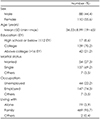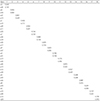Abstract
Objectives
The aim of this study was to develop a brief schema questionnaire for adults (BSQ-A) and investigate its validity and reliability.
Methods
A 36-item questionnaire was developed or selected by six psychiatrists. The questionnaire was administered to 209 subjects in Seoul and Gyeonggi area. The construct validity was investigated by performing principal component analysis, and the reliability was assessed in terms of the internal consistency using Cronbach's alpha.
Results
The principal component analysis revealed 18 factors underlying 18 early maladaptive schemas (EMSs). These 18 factors accounted for 87.488% of the common variance. The Cronbach's alpha was high, indicating that the reliability of the questionnaire was satisfactory. Every schema showed a positive correlation with most psychological measures.
Figures and Tables
Table 4
Pearson's correlations between the BSQ-A, YSQ-S3, SCL-90-R, K-MDQ, SRI, and K-SPRINT (n=198)

* : p<0.05, ** : p<0.01. BSQ-A : Brief Schema Questionnaire for Adult, YSQ-S3 : Young Schema Questionnaire-short form 3, SCL-90-R : Symptom checklist-90-Revision, K-MDQ : Korean version Mood Disorder Questionnaire, SRI : Stress Response Inventory, K-SPRINT : Korean version of the short post-traumatic stress disorder Rating Interview
References
1. McGinn LK, Young JE. Schema-focused therapy. In : Salkovskis PM, editor. Frontiers of cognitive therapy. The New York, NY: Guilford Press;1996. p. 182–207.
2. Beck AT. Depression: clinical, experimental, and theoretical aspects. Philadelphia, PA: University of Pennsylvania Press;1967.
3. Young JE, Klosko JS, Weishaar ME. Schema therapy: a practitioner's guide. New York, NY: Guilford Press;2003.
4. Cockram DM, Drummond PD, Lee CW. Role and treatment of early maladaptive schemas in Vietnam Veterans with PTSD. Clin Psychol Psychother. 2010; 17:165–182.

5. Roper L, Dickson JM, Tinwell C, Booth PG, McGuire J. Maladaptive cognitive schemas in alcohol dependence: changes associated with a brief residential abstinence program. Cognitive Therapy and Research. 2010; 34:207–215.

6. Shorey RC, Stuart GL, Anderson S. Early maladaptive schemas among young adult male substance abusers: a comparison with a non-clinical group. J Subst Abuse Treat. 2013; 44:522–527.

7. Shorey RC, Anderson S, Stuart GL. Gambling and early maladaptive schemas in a treatment seeking sample of male alcohol users: a preliminary investigation. Addict Disord Their Treat. 2012; 11:173–182.

8. Young J, Brown G. YSQ-L3. New York, NY: Schema Therapy Institute;2003.
9. Lee SJ, Choi YH, Rim HD, Won SH, Lee DW. Reliability and validity of the Korean Young Schema Questionnaire-short form-3 in medical students. Psychiatry Investig. 2015; 12:295–304.

10. Kriston L, Schäfer J, Jacob GA, Härter M, Hölzel LP. Reliability and validity of the German version of the Young Schema Questionnaireshort form 3 (YSQ-S3). Eur J Psychol Assess. 2013; 29:205–212.

11. Lyrakos DG. The validity of Young Schema Questionnaire 3rd version and the Schema Mode Inventory 2nd version on the Greek population. Psychology. 2014; 5:461–477.
12. Casañas R, Catalan R, Casas M, Raya A, Fernandez EM, Escudero E, et al. P02-22 - Effectiveness of a psychoeducational group intervention in patients with mild/moderate depression in primary care (PC): randomized controlled trial. Eur Psychiatry. 2011; 26:616.

13. Rummel-Kluge C, Pitschel-Walz G, Kissling W. Psychoeducation in anxiety disorders: results of a survey of all psychiatric institutions in Germany, Austria and Switzerland. Psychiatry Res. 2009; 169:180–182.

14. Kim K, Kim J, Won H. Korean Manual of Symptom Checklist-90-Revision. Seoul: Jung Ang Juk Sung Publisher;1984. p. 8–10.
15. Bastien CH, Vallières A, Morin CM. Validation of the Insomnia Severity Index as an outcome measure for insomnia research. Sleep Med. 2001; 2:297–307.

16. Cho YW, Song ML, Morin CM. Validation of a Korean version of the Insomnia Severity Index. J Clin Neurol. 2014; 10:210–215.

17. Hirschfeld RM, Williams JB, Spitzer RL, Calabrese JR, Flynn L, Keck PE Jr, et al. Development and validation of a screening instrument for bipolar spectrum disorder: the Mood Disorder Questionnaire. Am J Psychiatry. 2000; 157:1873–1875.

18. Jon DI, Yoon BH, Jung HY, Ha KS, Shin YC, Bahk WM. A validation study of the Korean version Mood Disorder Questionnaire (K-MDQ). J Korean Neuropsychiatr Assoc. 2005; 44:583–590.
19. Koh KB, Park JK, Kim CH. Development of the Stress Response Inventory. J Korean Neuropsychiatr Assoc. 2000; 39:707–719.
20. Kim TS, Chung MY, Kim W, Koo YJ, Ryu SG, Kim EJ, et al. ; Disaster Psychiatry Committee in Korean Academy of Anxiety Disorders. Psychometric properties of the Korean version of the Short Post-Traumatic Stress Disorder Rating Interview (K-SPRINT). Psychiatry Clin Neurosci. 2008; 62:34–39.

21. Kline P. The handbook of psychological testing. London: Routledge;2013.
22. Wang CE, Halvorsen M, Eisemann M, Waterloo K. Stability of dysfunctional attitudes and early maladaptive schemas: a 9-year follow-up study of clinically depressed subjects. J Behav Ther Exp Psychiatry. 2010; 41:389–396.

23. Renner F, Lobbestael J, Peeters F, Arntz A, Huibers M. Early maladaptive schemas in depressed patients: stability and relation with depressive symptoms over the course of treatment. J Affect Disord. 2012; 136:581–590.

24. Cámara M, Calvete E. Early maladaptive schemas as moderators of the impact of stressful events on anxiety and depression in university students. J Psychopathol Behav Assess. 2012; 34:58.

25. Hawke LD, Provencher MD. Schema theory and schema therapy in mood and anxiety disorders: a review. J Cogn Psychother. 2011; 25:257–276.





 PDF
PDF ePub
ePub Citation
Citation Print
Print






 XML Download
XML Download